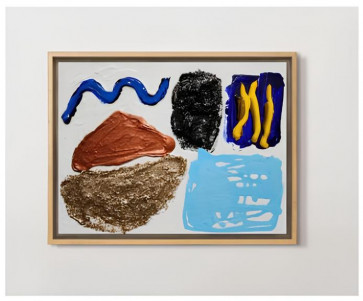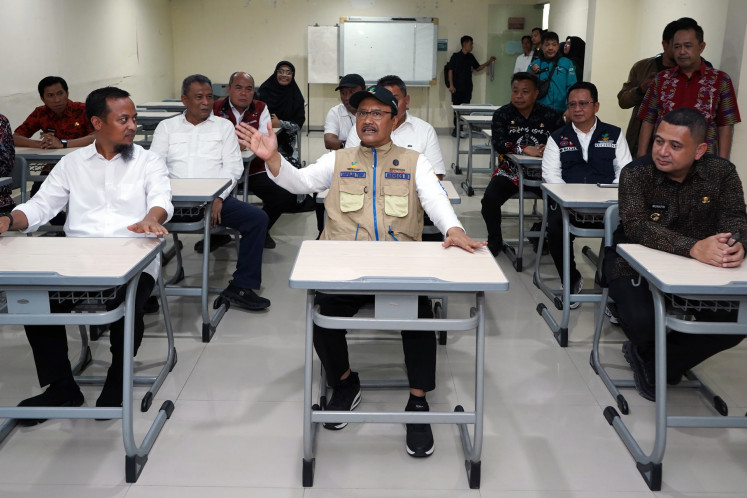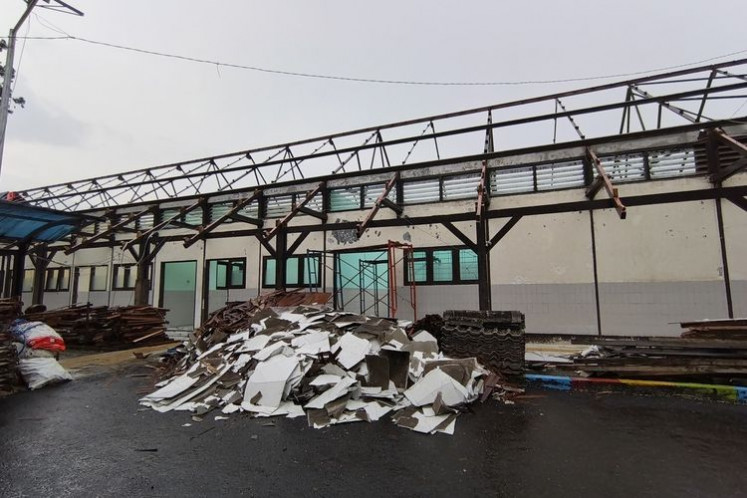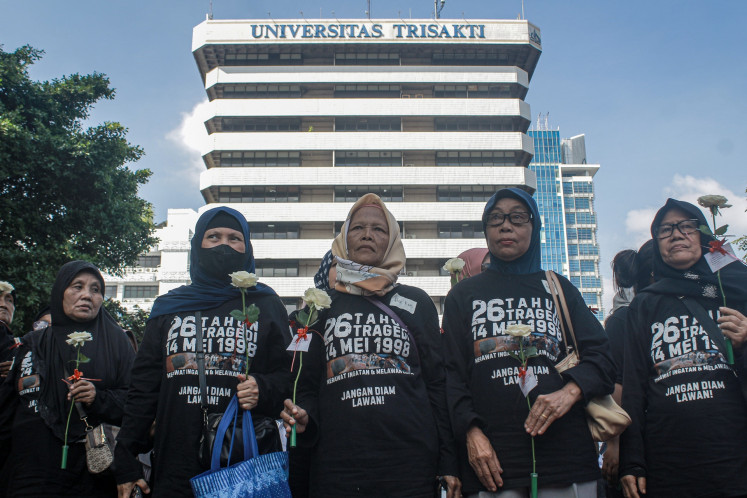Berndt Soderbom: Setting creativity free in people for an added advantage
(Courtesy of McCann)His lilting speech is a reminder of his Swedish homeland, but Berndt Soderbom came out of Scandinavia’s frigid climes to embrace the tropical warmth of Southeast Asia
Change text size
Gift Premium Articles
to Anyone

(Courtesy of McCann)His lilting speech is a reminder of his Swedish homeland, but Berndt Soderbom came out of Scandinavia’s frigid climes to embrace the tropical warmth of Southeast Asia.
“I would get offers for consultancy work in Asia, and with it the chance to get away from the cold and snow, and of course I would take it,” the genial president director of McCann Worldgroup Indonesia says with a chuckle.
“And I found over the years that I like the cultures of Asia, whether it’s in Singapore, Malaysia, Thailand, Hong Kong and here in Indonesia.”
Married to a Singaporean and a resident of the region for most of the past three decades, he has built a highly successful career in integrated marketing, advertising, communication strategy and brand building – and weathered the huge challenge of the 1997 Asian economic crisis along the way.
His entry into Asia began in the early 1980s, working for Swedish furniture giant IKEA in developing its marketing strategy in the continent and also Australia. He later moved to Swedish-based international management consultancy, Indevo, becoming its managing director in Singapore and supervising the transition of the Asian operations to its sale to Price Waterhouse.
In 1990, he founded a small communications company in Singapore, and soon opened a branch in Kuala Lumpur. Jakarta, part of his business travels over the years, was the natural next step.
“I saw a lot of opportunities here, and I had the clients. I contacted my clients and asked them if they would be interested in working with me. And they were.”
Business was so good that it rapidly expanded and outstripped the opportunities in the other two locations. Soderbom made the decision to focus on the Indonesian operations of the firm, Kreasindo.
They were the heady days of the Indonesian advertising boom, with the advent of private commercial TV in the late 1980s and early 1990s. He speaks of average 40 percent growth in the first five years of business and a slew of honors for Kreasindo.
Inevitable growing pains accompany spectacular growth. But nothing prepared Soderbom for the region-wide economic crisis that struck in 1997, with Indonesia hardest hit as the rupiah went into free-fall.
“It was like driving into a wall,” he said bluntly. “Everything stopped right then … The expats were paid in foreign currencies, and my payroll went up three times overnight. I kept a spreadsheet on my desk to determine the daily currency rates. It was crazy.”
The number of ad agencies slumped from 200 to only 28 at the height of the crisis, he said.
“During the crisis, whatever job there was, we took it because we needed to eat. Either we were dying or we were surviving. I had people coming in saying their uncle needed a business card, and we would do it.”
He devised a plan of action, cutting the fat by sending home expatriate consultants but striving to retain the rest of the local workforce. The effort included securing support from Chicago-based partner Leo Burnett Worldwide.
“I knew that if I could keep all the people, more or less, then we would stand out, we would be strong and we would help our clients. I could go out and pitch to the clients, who were in the same boat as us.”
By mid-year, business gradually started to pick up. And the investment in people paid off for Soderbom because, “we were still strong while other agencies needed to start to rebuild”.
He emphasizes people in listing the most important lessons he learned from the crisis.
“The number one was to have a strong corporate culture in place. If I didn’t have the dedicated team, the people, then I wouldn’t have survived,” he said.
Another lesson was in serving clients despite the troubles.
“When the crisis hit, it was like a war for them,” Soderbom said. “When you go out into the market, they don’t know what to do with their strategy. They have to come out of their box about how they think or how their headquarters in Europe thinks. Then we come together and we work together, and that’s how our relationship becomes stronger.”
In a spectacular comeback, the company won the top Indonesian agency award for three consecutive years in 1999-2001. In 2004, after selling the agency to Leo Burnett, an admittedly tired Soderbom returned to work in Singapore with his family residing in Australia.
System building
He was tempted back to Indonesia in late 2011 with the position at McCann, formerly McCann Erickson, the venerable advertising giant that is doing its best to change with changing times as it marks 101 years in business.
“We’re introducing a new system. We’re building on the McCann heritage. We need to upgrade and improve,” he said.
With his many years of experience working with prestigious brands like Coca-Cola, Procter & Gamble and McDonald’s, Soderbom says he enjoys the luxury of picking where he wants to work. In his younger days, his ambition was to have the best agency for quality of work and clients and he thrived on the excitement of making a successful pitch.
He says he now knows that people are the most important part of an organization and its lifeblood for success.
“You must have an effective human resources system. You need to work with employees on their professional and also their personal goals. What do they want to do? Go abroad? Have a fancy car? It’s about marrying all these things,” he said.
“When I first came into McCann, it was a like a bank. Now it’s really buzzing like an agency. You can feel the creativity.”
There is always the issue of underperforming employees. Soderbom believes in finding out what is the problem instead of simply dismissing or sidelining them.
“You need to sit down and find out. There are people who want to do it, but don’t know how to do it, because of their training. You need to get them the training so they can,” he said.
When it comes to competent but recalcitrant employees, options are limited.
“For those who just don’t want to do it, well, you have to kick them nicely in the backside ... But if they still won’t do it, then you have to tell them, “I’m sorry, we are an agency with our goals and own corporate culture, it’s better you find an agency that is suited to you’.”
He also understands that strategic investment in developing employees, even when they eventually move on to other firms, stands the company’s reputation in good stead.
“When they leave and say, ‘McCann was very good, they taught me this …’ , they become my best PR person in going out in the market. Instead of them saying, ‘Oh, McCann, they’re terrible’.”
RI return
His years away from Indonesia, including a stint working in Sweden, allowed him to regroup after the “craziness” of running an advertising agency for almost 15 years. But he and his family – he has two daughters – missed Indonesia.
“In Sweden, I felt at home, but I was a foreigner in my own country,” he said. “I spent so many years in Asia that my values in life had changed. When I was working with Swedish people, I would think, ‘why are they reacting like that?’ ‘Why aren’t they doing it like this?’”
Returning to Indonesia was like “coming home”, he said. “When I was coming out of Soekarno-Hatta airport, the smells told me I was back.”
In a span of only seven years, he could see the many positive changes in the advertising industry, especially in the creativity and sharing of ideas fostered in the Internet age.
But he also laments what he terms a “falling back” in standards.
“My philosophy is always to do good work and of a high quality to build our client’s business. Some companies only focus on who they know and take in business that way. The quality, professionalism and passion are not there. They cut a deal because they know the company, but they don’t care about it.”
Still, he is very positive about Indonesia, the fastest growing country in the world in the ad industry in recent years.
Again, it comes down to the potential of people.
“Indonesian society is very creative, and the people can learn. It’s very easy to teach people here, while it’s much more difficult in other countries in Asia. The future is very, very bright. Indonesia will leapfrog, especially in the area of creativity,” Soderbom said.
Place and date of birth
Stockholm, June 3, 1950
Career experience
2011 – present President Director, McCann Worldgroup, Jakarta
2009 – 2011 Managing Consultant/Owner, Söderbom & Associates, Singapore & Sweden
2004 – 2008 Director/Owner, Bookbinders Design, Singapore
1990 – 2004 Founder/Owner and CEO, Kreasindo Pte Ltd, Jakarta (later Leo Burnett Kreasindo)
1985 – 1990 Senior Consultant and later Managing Director, Indevo Management Consultants, Singapore
1983 -1985 Executive Creative Director/Consultant, IKEA Sweden/Dentsu, Young & Rubicam (DYR), Singapore
1980 – 1982 Creative Director/Consultant, IKEA, Sweden & Europe
Education
• Graduate, Institute of Marketing, Sweden
• B.Sc. in Industrial Design,
University of Stockholm









